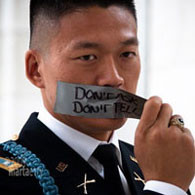Almost two decades after it was introduced as a way to allow gay soldiers to remain in the US military, the "Don't Ask, Don't Tell" (DADT) policy that effectively prevented openly gay and lesbian personnel from serving is officially off the books as of Tuesday, Sep 20.

Gays and lesbians may now serve openly in the military, and individuals discharged under DADT may apply to rejoin.
Former army lieutenant Dan Choi, who was discharged from service under the military's DADT policy after coming out on "The Rachel Maddow Show", says he is planning to reenlist.
The 30-year-old California-born Korean-American became a gay rights icon after his resulting military discharge galvanised opposition to DADT. His activism led to trouble with the law, and he was later arrested for chaining himself to the White House fence during a protest.
He tells his story in a Global Post interview published Sep 20, 2011:
Choi’s mission to find himself in California after returning from 18 months serving in Iraq had yielded an answer: activism.
“Everything came together,” he said. “Being a veteran, an Asian minority, an Arab linguist, gay, Christian. I always thought I needed to compartmentalize my life. When I became an activist, there was finally this coalescence of all of these identities. It was like a symphony.”
...
“I was closeted the entire time. I never wanted to come out. In fact, I thought the military’s ‘Don’t Ask, Don’t Tell’ policy was a good thing for me because I could hide behind that.”
His new boyfriend introduced him to politics and LGBT activism. In 2008 Choi celebrated his first Valentine’s Day with a partner.
“I didn’t even know about Obama and ‘Don’t Ask, Don’t Tell,’” Choi recalls. “I voted for him because he was black. I wasn’t even that liberal in the military. I didn’t really have political views.”
...
By May, two major forces in Choi’s life were waging war on his psyche. On one hand, he had a military career he was fully dedicated to. On the other hand, he had met the love of his life but most of his inner circle still didn’t know he was gay. So he started telling them.
“That was probably the hardest time,” Choi said. “Being in the military with a boyfriend that I wanted to marry. I thought, ‘How am I going to be able to keep being in the military this way?”
